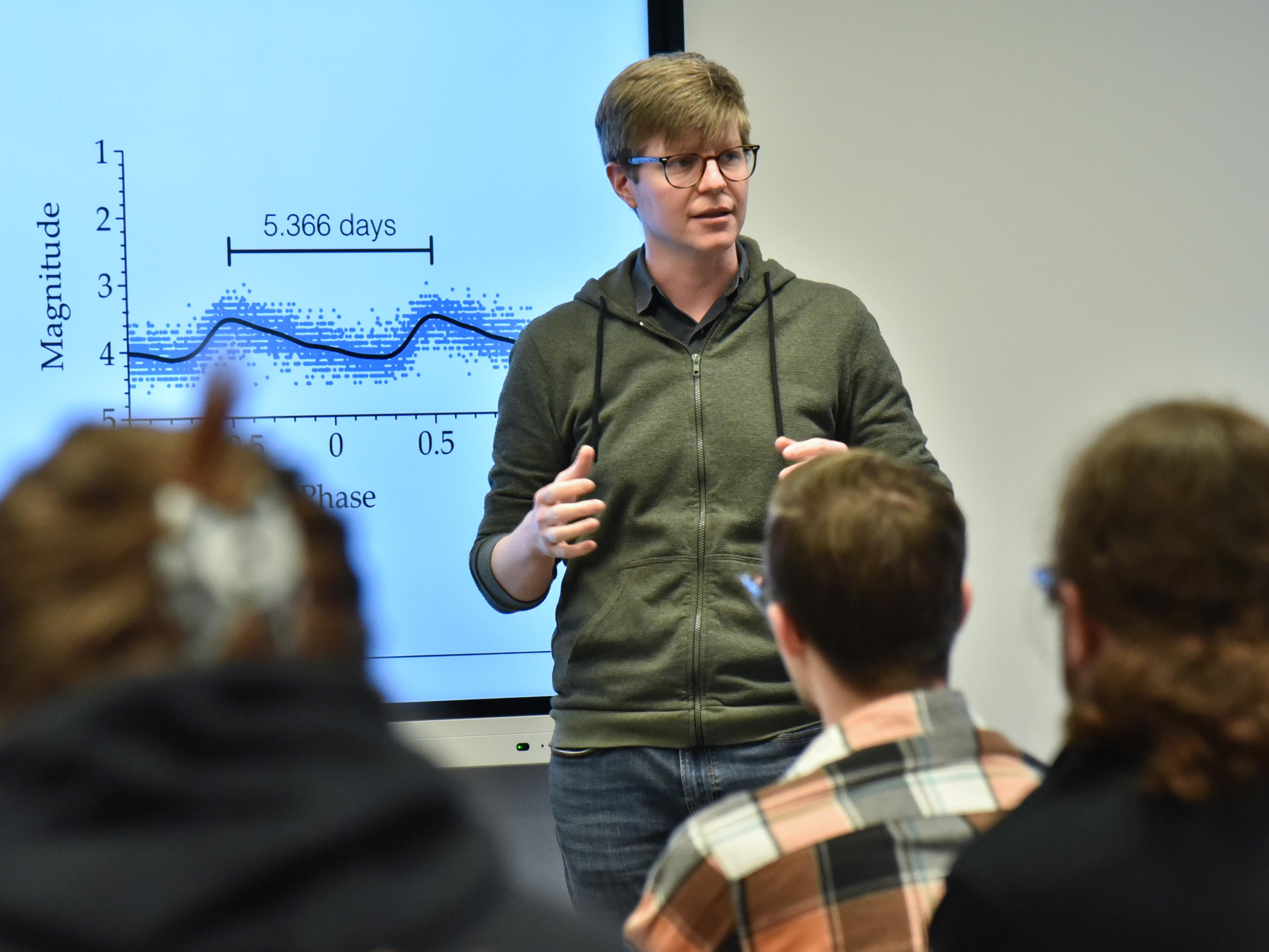Earl Bellinger, a 2012 SUNY Oswego graduate who is now an assistant professor at Yale University, is among the distinguished invited speakers who will provide guest lectures on April 8, the day of the total solar eclipse
For the total solar eclipse on Monday, April 8, SUNY Oswego’s activities will include a series of distinguished speakers giving invited talks from 9 a.m. to 1 p.m. in Room 122 of the Shineman Center.
These talks are free and open to the public -- thanks to a Shineman Endowed Fund grant and support from SUNY Oswego and its College of Liberal Arts and Science -- but due to space considerations, tickets are required via the campus box office.
SUNY Oswego Distinguished Professor of Physics Shashi Kanbur, a world-renowned astrophysics researcher, organized the day’s activities and will offer a welcome at 9 a.m., joined by university President Peter O. Nwosu.
Invited talks will begin at 9:15 a.m. with Sarbani Basu, the William K. Lanman Jr. Professor of Astronomy at Yale University. Basu conducts research in the fields of solar and stellar astrophysics. She has been studying both the general properties and the details of the structure and dynamics of the Sun, focusing on solar-cycle dependencies. Basu’s interest in putting the Sun in a general astronomical context has led her to use asteroseismic data obtained by the Kepler and TESS spacecrafts to study other stars.
The 9:45 a.m. talk will feature Martin Hendry, a professor of gravitational astrophysics and cosmology at the University of Glasgow in Scotland, where he is also clerk of senate and vice principal of the university. He is a senior member of the LIGO Scientific Collaboration, a global team of more than 1,500 scientists who, with their colleagues in the Virgo Collaboration, made the first-ever detection of gravitational waves – a discovery awarded the 2017 Nobel Prize for Physics. Hendry is a Fellow of the Institute of Physics and is also a Fellow (and currently vice president) of the Royal Society of Edinburgh, Scotland’s National Academy of the Arts and Sciences. A passionate advocate for science education and communication, in 2015 he was awarded an MBE (Member, Order of the British Empire) by Queen Elizabeth II for services to the public understanding of science.
SUNY Oswego alumnus Earl Bellinger, currently an assistant professor of astronomy at Yale University, will speak at 10:30 a.m. He completed his undergraduate studies at SUNY Oswego in 2012, double majoring in computer science and applied mathematics. He did internships at NASA and the National Institute for Standards and Technology before earning his master's in computer science at Indiana University and his Ph.D. at the University of Göttingen in Germany. He was then a Postdoctoral Fellow at the Stellar Astrophysics Centre in Denmark, and subsequently a Postdoctoral Fellow at the Max Planck Institute for Astrophysics in Germany. His research focuses on stellar evolution and pulsations, and how measurements of pulsating stars can lend precision constraints to various fields throughout astrophysics – research he began under Kanbur as an Oswego undergraduate.
An 11:30 a.m. guest lecture will feature Anil Pradhan, a professor in the Department of Astronomy, Chemical Physics Program, Interdisciplinary Biophysics Graduate Program at Ohio State University. Pradhan is the Director and Co-Founder of Indo-US Center for STEM Education and Research. He also is a Fulbright-Nehru Distinguished Teaching and Research Scholar.
At noon, professor Lyn Blanchfield of SUNY Oswego’s history program will discuss eclipses in a historical context. Blanchfield, who has a Ph.D. in late medieval Italian history, has a research focus on the history of religious rituals in medieval Italy and gender and emotions in the medieval world. She has been teaching history at SUNY Oswego since 2010 and is also the SUNY Oswego Fulbright Program Advisor for the U.S. Fulbright Program.
At 12:30 p.m. students in SUNY Oswego’s Honors 300 class will present on topics related to how the eclipse was observed and contextualized in ancient civilizations.
For more information on eclipse-related activities at SUNY Oswego, visit oswego.edu/eclipse.




